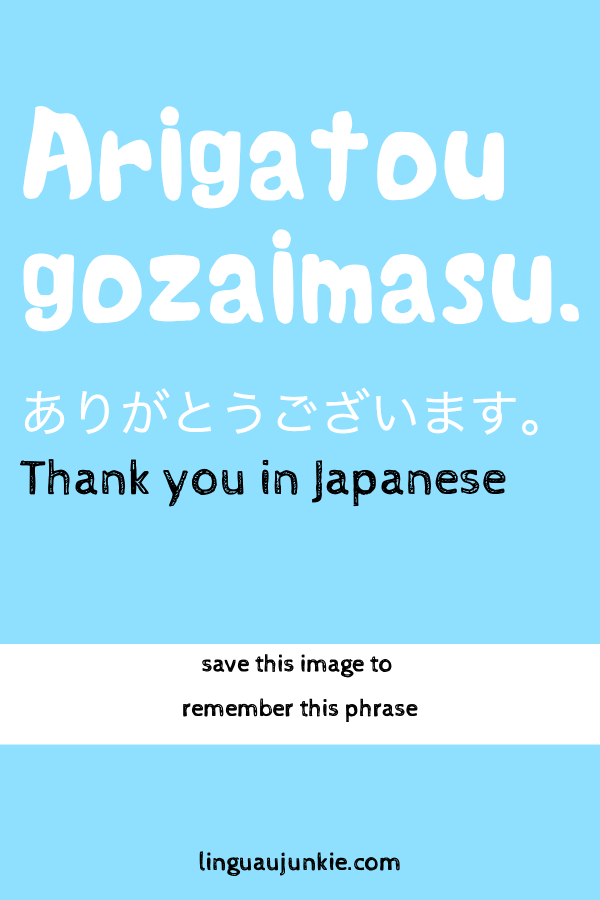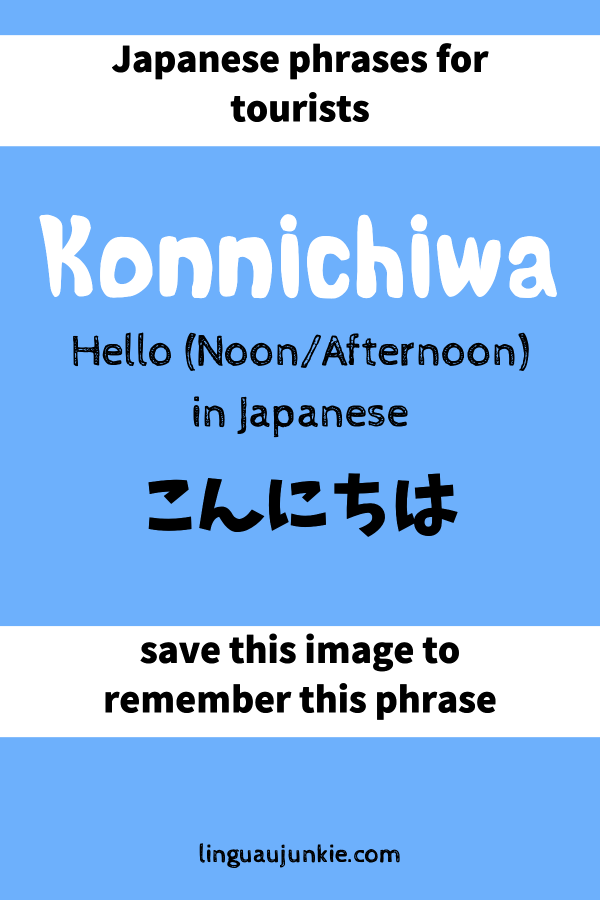I’m assuming you want to visit Japan….
And you want to learn Japanese phrases for tourists.
Which means that you want phrases you can quickly use… and don’t want figure out grammar.
And there’s nothing wrong with that. People start learning Japanese through various ways.
So, this guide will teach you 30+ Japanese tourist phrases you can understand and use A.S.A.P, even if you don’t know the language at all.
And as a result…your trip will be more enjoyable, you’ll impress Japanese locals, and perhaps this could kickstart your journey to actually learning Japanese.
Let’s jump in.
Note: The suggested pronunciations are not written for accuracy but for English speakers to be able to understand it via English letters.
1. Arigatou gozaimasu.
- Meaning: Thank you (formal/polite)
- Pronunciation: Aree-ga-tow goh-zai-mas (zai rhymes with sky)
- Japanese: ありがとうございます。
This is how you say thank you in Japanese.
And the most important word to know in a foreign language is… “Thank you.” Japanese people tend to use polite language unless they are close friends. So, this version of “Thank you” is formal enough that you can use it in every situation!

2. Konnichiwa
- Meaning: Hello (Noon or Afternoon)
- Pronunciation: Kon-nee-chee-wa
- Japanese: こんにちは
This is the most common way to say hello in Japanese.
But… although many people know the word “Konnichiwa” as “Hello,” it is only used around noon to afternoon. You wouldn’t use it in the morning, evening, or night, even if you wanted to say “hello” to someone at that time.
For those, you’d need these next few phrases.

3. Ohayou gozaimasu
- Meaning: Good morning.
- Pronunciation: Oh-hah-yo go-zai-mas
- Japanese: おはようございます
If you need to greet someone in the morning you should say “Ohayou gozaimasu”.
4. Konbanwa
- Meaning: Good evening
- Pronunciation: Kon-bahn-wa
- Japanese: こんばんは
In the evening, the greeting would be “Konbanwa”. Make sure to use the correct greeting during each time of day!
5. Hajimemashite
- Meaning: Nice to meet you
- Pronunciation: Ha-jee-meh-mash-teh
- Japanese: はじめまして
Of course, if you’re going to meet people and say hello…
You may as well also say “nice to meet you.”
6. Watashi no namae wa ____ desu.
- Meaning: My name is (name).
- Pronunciation: Wata-shee no na-mah-eh wa (name) desu.
- Japanese: 私の名前は (name) です。
You might run into a situation where you need to introduce yourself in Japanese. In Japanese, you will need to say your last name before your first.
But if you’re just communicating with random people, you can just keep it casual and say your first name.
If you want to go more casual…
- (name) desu.
- Meaning: I’m (name).
- Pronunciation: (name) desu.
- Japanese: (name) です。
7. Tasukete kudasai
- Meaning: Please help me.
- Pronunciation: Tass-ke-te kooda-sai
- Japanese: 助けてください
If you need assistance you can ask this in Japanese for help! Japanese people are usually willing to help strangers.
8. Nihongo ga wakarimasen.
- Meaning: I don’t understand Japanese.
- Pronunciation: Nee-hon-go gah waka-ree-mah-sen
- Japanese: 日本語が分かりません。
If someone starts talking to you in Japanese, you can use this phrase to let them know you don’t understand. Chances are, they can either use a translator app or find someone who can speak English.
9. Toire wa doko desuka?
- Meaning: Where is the bathroom?
- Pronunciation: To-ee-re wa do-ko des ka?
- Japanese: トイレはどこですか?
Ah, one of the most important Japanese phrases for tourists.
While traveling, it can be important to find a bathroom. This phrase can help you when you need to figure out where the bathroom is.
10. Okaikei onegaishimasu.
- Meaning: Check, please.
- Pronunciation: Oh-kai-kay (Kai rhymes with sky)
- Japanese: お会計お願いします。
After finishing up a meal at a restaurant, you can ask for the bill by saying “Okaikei onegaishimasu”!
11. Osusume wa nandesuka?
- Meaning: What is your recommendation?
- Pronunciation: Oh-soo-soo-meh wa nan des ka?
- Japanese: おすすめはなんですか?
If you’re trying a new type of restaurant or cuisine, you can always ask for a recommendation so that you know what to order.
12. Onegaishimasu.
- Meaning: Yes, please/Please.
- Pronunciation: Oh-neh-gai (gai like “guy”) she-mas
- Japanese: お願いします。
This can be useful if you’re answering someone who is helping you out. For example, if you’re buying a ticket and the ticket attendant is confirming your trip details, you can use this phrase.
Or, think about it this way. If someone says, “would you like more water?” In English, you can say “Please” as a request. Onegaishimasu works in that same way.
You wouldn’t use this word with a noun (like water + please), but more so as a request coupled with a please (please do it.)
13. Kore kudasai.
- Meaning: Please give me this.
- Pronunciation: Koh-re kooda-sai (sai like sigh)
- Japanese: これください。
Japan has many markets and vendors in alleys and shopping streets. If you’re visiting a market while in Japan, this is a necessary phrase to try.
By the way, “Kudasai” means please and is what you would use with a noun like “this” or “water,” as per the next Japanese tourist phrase.
14. Omizu o kudasai.
- Meaning: Water please.
- Pronunciation: Oh-mee-zoo oh kooda-sai
- Japanese: お水をください。
Water is usually free in Japanese restaurants so you can easily ask for it using this phrase.
15. Ikura desuka?
- Meaning: How much is this?
- Pronunciation: Ee-koo-rah des ka?
- Japanese: いくらですか?
If you need to clarify the price of a product, you can ask the price using the phrase.
16. Eki wa doko desuka?
- Meaning: Where is the train station?
- Pronunciation: Eh-kee wa doh-ko des ka?
- 駅はどこですか?
Trains are an important part of Japanese culture, and any trip to Japan will usually involve trains! If you’re confused about where the nearest station is, you can ask with this phrase.
17. Wakarimasen.
- Meaning: I don’t understand.
- Pronunciation: Waka-ree-mah-sen
- Japanese: 分かりません。
If you’re having difficulty communicating, you can use this phrase to let the other person know you don’t understand.
18. Sayounara
- Meaning: Goodbye.
- Pronunciation: Sai-yo-na-rah
- Japanese: さようなら。
This is how you say bye in Japanese. But, there’s a big “but.” This is a forever/long-time kind of “goodbye” where you won’t see them for a long time. So, best not to use it with friends.
Maybe you can say it as you’re leaving Japan.
19. Mata ne.
- Meaning: See you soon (casual).
- Pronunciation: Mah-tah neh.
- Japanese: またね
If you made a friend in Japan, you can say this to casually signify that you’ll see them soon!
This is the casual way of saying bye.
20. Michi ga wakarimasen.
- Meaning: I don’t know the way.
- Pronunciation: Mee-chi ga waka-ree-masen
- Japanese: 道が分かりません。
When you’re traveling it is common to get lost. If you use this phrase someone could help you find the directions!
21. Kurejitto kaado wa tsukaemasuka?
- Meaning: Can I use a credit card?
- Pronunciation: Koo-re-jitto kah-do wa tsoo-kah-eh-mas ka?
- Japanese: クレジットカードは使えますか?
Many restaurants in smaller cities in Japan are cash-only. But big cities should be no problem. Either way, use this phrase just to see if they accept cards.
22. Kippu no kai kata ga wakarimasen.
- Meaning: I don’t know how to buy the ticket.
- Pronunciation: Keeppu no kai-kata ga wakaree-masen
- Japanese: きっぷの買い方がわかりません。
Whether you’re trying to buy tickets to an attraction or transportation, it can be helpful to use this phrase to get assistance.
Confused tourists huddled around a train ticket machine is a common sight, so if you want to skip the frustration… use this phrase with train staff.
And if you want to get someone’s attention, use this next phrase.
23. Sumimasen.
- Meaning: Excuse me or sorry
- Pronunciation: Soo-mee-ma-sen
- Japanese: すみません。
This is a versatile word that can either get someone’s attention or apologize for something.
24. ____ ga taberaremasen.
- Meaning: I can’t eat _____
- Pronunciation: ____ ga tabe-rah-re-masen
- Japanese: ____が食べられません。
If you have some food allergies, intolerances, or preferences you can look up the food name in Japanese and insert it into this phrase.
You may be interested in this guide on vegan/vegetarian/allergy requests: https://www.linguajunkie.com/japanese/vegan-in-japanese
25. Chuumon shite mo iidesuka?
- Meaning: Can I order?
- Pronunciation: Chuu-mon shte moh ee des ka?
- Japanese: 注文してもいいですか?
Once you’re ready to order at a restaurant, you can say this to let the waiter know you’re ready to order.
You may also be interested in:
26. Ima nanji desuka?
- Meaning: What time is it?
- Pronunciation: Eema nan-jee des ka?
- Japanese: 今何時ですか?
If you’re outside and happened to forget your phone or watch, you can ask someone this phrase to figure out the time.
27. ______ wa doko desuka?
- Meaning: Where is _____?
- Pronunciation: _____ wa doh-ko des ka?
- Japanese: ___はどこですか?
This is a useful phrase that you can use to figure out where something is. For example, you can insert the name of the attraction you’re heading towards.
28. Eigo o hanasemasuka?
- Meaning: Can you speak English?
- Pronunciation: Ey-go oh hana-se-mas ka?
- Japanese: 英語を話せますか?
Before trying to communicate in Japanese, you can try and ask if they can speak in English.
29. Itadakimasu.
- Meaning: Thank you for the food.
- Pronunciation: Ee-tada-kee-mas
- Japanese: いただきます。
If you’re eating with Japanese people, you’ll want to say this phrase before starting your meal. In Japanese culture, it is customary to show appreciation for the meal before eating with this phrase.
30. Totemo oishii desu.
- Meaning: It’s very delicious.
- Pronunciation: Toh-te-mo oh-ee-she des
- Japanese: とてもおいしいです。
In Japan, there are often small restaurants with few seats and one chef. If you’re eating at a small place like that, it could be useful to mention this phrase after trying the food to show your appreciation!
Now You Know…
Now you know some must know Japanese phrases for tourists.
But maybe I am missing something.
So, leave a comment and tell me what else belongs on here.
You may also be interested in the following lessons as well..
- Japanese survival phrases
- Japanese travel phrases
- Japanese survival phrases course for beginners (Free 3 month access by JapanesePod101) – click here.
– The Main Linguajunkie
P.S. Interested in learning Japanese? This Japanese course for Absolute Beginners from JapanesePod101 is FREE for a limited time only. They plan to close it down in the future, but while it’s still open, give it a try. Click the image below.
